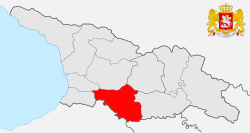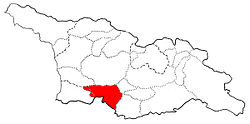- Meskheti
-
Meskheti Region
მესხეთის მხარე
Meskhetis Mkhare— Region — Map highlighting the modern political subdivision Map highlighting the historical region of Meskheti in Georgia Country  Georgia
GeorgiaGovernment – Governor Giorgi Khachidze Meskheti (Georgian: მესხეთი) is in a mountainous area of Moschia and is a former province in southwestern Georgia. The ancient Georgian tribes of Meskhi (or Moschi) and Mosiniks were the indigenous population of this region. A majority of the modern Georgian population (Meskhs) of Meskheti are descendants of these ancient tribes. The Mosiniks (or Mossynoeci) were one of the inventors of iron metallurgy. In the 2nd millennium-4th century BC Meskheti was a part of the Georgian Kingdom of Diaokhi, in the 4th century BC-6th century AD - part of the Kingdom of Iberia. In the 10th-15th centuries this region was a part of the united Georgian Kingdom. In the 16th century Meskheti was occupied and annexed by the Ottoman Empire. In 1829-1917 the region was a part of Tbilisi Governate (Tiflisskaia Gubernia), in 1918-1921 part of the Democratic Republic of Georgia, and in 1921-1990 part of the Georgian SSR. Since 1990 Meskheti (Samtskhe-Javakheti region) has been a province of the republic of Georgia.
Contents
Meskhetian Turks
Meskhetian Turks are the former Turkish inhabitants of Meskheti region of Georgia, along the border with Turkey. They were deported to Central Asia during November 15-25 1944 by Joseph Stalin and settled within Kazakhstan, Kyrgyzstan, and Uzbekistan. Of the 120,000 forcibly deported in cattle-trucks a total of 10,000 perished.[1] Today they are dispersed over a number of other countries of the former Soviet Union. There are 500,000 to 700,000 Meskhetian Turks in exile in Azerbaijan and Central Asia.[2][3] Meskhetian Turks are Sunni Hanafi Muslims.
See also
References
- ^ http://www.guardian.co.uk/news/2003/apr/05/guardianobituaries.usa as retrieved on 29 April 2008 20:59:44 GMT
- ^ Meskhetian Turks Bouncing From Exile to Exile
- ^ The Meskhetian Turks at a Crossroads
External links
Literature
- (Georgian) თაყაიშვილი ე., არქეოლოგიური ექსპედიცია კოლა-ოლთისში და ჩანგლში, ტფ., 1907;
- (Georgian) ლომსაძე. შ., სამცხე ჯავახეთი (XVIII ს. შუაწლებიდან XIX საუკუნის შუა წლებამდე), თბ., 1975;
- (Georgian) მუსხელიშვილი დ., ქსე, ტ. 6, გვ. 601-602, თბ., 1983
- (Georgian) ნოზაძე ვ. საქართველოს აღდგენისათვის ბრძოლა მესხეთის გამო, თბილისი, 1989;
Historical regions of Georgia  Categories:
Categories:- Former provinces of Georgia (country)
- Caucasus
Wikimedia Foundation. 2010.


